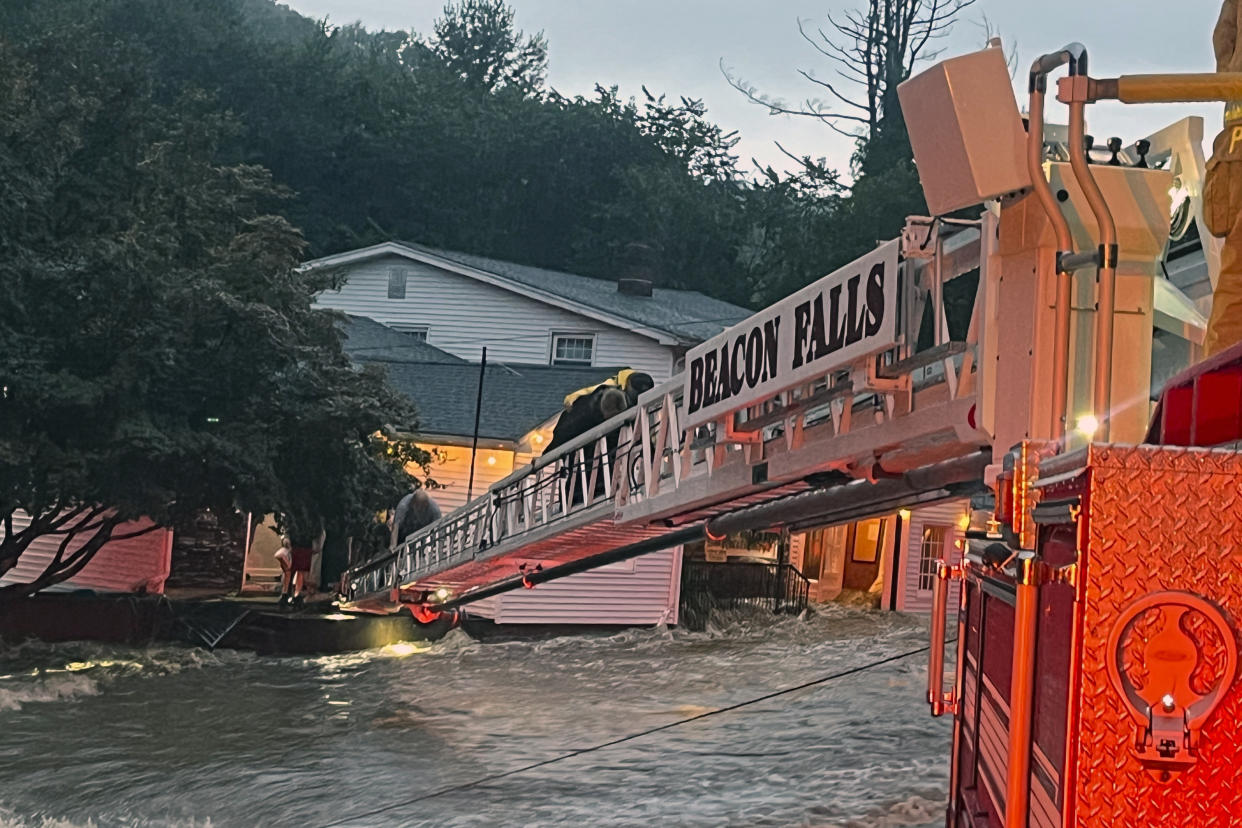Flash flooding leaves at least 2 reportedly dead in Connecticut, stranding drivers and flooding roads across Northeast

Severe storms hit parts of New York, New Jersey and Connecticut late Sunday night, resulting in at least two people dead, at least 100 people evacuated and Connecticut Gov. Ned Lamont declaring a state of emergency.
The National Weather Service issued a rare flash flood emergency early Monday morning — the highest level of flood warning — and called the storm a “particularly dangerous situation.” Parts of southwestern Connecticut and Long Island received as much as 10 inches of rain.
Weather officials say the flooding is unrelated to Hurricane Ernesto, which is heading up the East Coast after wreaking havoc throughout the Caribbean.
What is a flash flood emergency?
The NWS classifies a flash flood as a result of a slow-moving thunderstorm or when storms move over the same area in succession. Flash floods are quick and occur within six hours or less following the storm, which makes them “more life-threatening” than other types of floods.
Nearly half of flash flood fatalities are vehicle-related, which is why experts typically warn, “Turn around, don’t drown” to prevent drivers from trying to drive through flooding.
There were numerous rescues in yesterday's Connecticut flood emergency, but this one was especially touching: https://t.co/CwoYEMJE3Npic.twitter.com/dJeWzFDqpJ
— The Weather Channel (@weatherchannel) August 19, 2024
What areas were most affected by the storm?
Connecticut
Gov. Lamont declared a state of emergency early Monday afternoon for what he called "historic flooding."
"The flooding washed out bridges and roads, and damaged or destroyed structures throughout the state," Lamont wrote in the declaration. "Hundreds of evacuations and swift water rescues were necessary to remove people from dangerous areas and shelters were opened."
There were flash flood emergencies declared for parts of Fairfield, New Haven, Litchfield and Hartford counties in Connecticut. CNN reported Monday morning that at least one person was reported missing in New Haven County.
Areas like Monroe, Conn., rarely get hit by so much rain and received 9.98 inches overnight, which NWS meteorologist David Stark described to CNN as a “one in a 200-year event for the city.”
INCREDIBLE video from Southbury Plaza, where a man was trapped in his car with his dog. He had a prosthetic leg and a Good Samaritan was able to rescue him and the dog, bringing them to higher ground. Thanks to Tania for sharing with us. pic.twitter.com/C6iFCnskqU
— Ryan Breton (@RyanBretonWX) August 18, 2024
According to local news, one person was found dead after being swept up by floodwaters in Oxford, Conn.
New York
About 1 million people in Suffolk County, N.Y., were issued a flash flood emergency warning early Monday morning. Flash flood warnings were issued for several counties north and west of New York City, as well as for Manhattan, the Bronx and Staten Island.
Chelsea Market in NYC flooding #nyc#stormpic.twitter.com/D3Qt3vuWY3
— Haley Morgan Ryger (@hmryger) August 18, 2024
Trains between New York and Philadelphia were temporarily suspended, and the Long Island Expressway, which connects Long Island and New York City, had to briefly shut down.
JFK and LaGuardia airports also experienced ground stops late Sunday due to the weather.
New Jersey
A flood watch was issued for areas of northern New Jersey ahead of the storm, with flooding reported on several highways — although none of the highways had to close.
Areas in places like Passaic were a concern for residents because of past issues with people getting swept up in currents toward the Passaic River. In 2021, two people died this way after getting caught in storm runoff following Hurricane Ida.
What should you do if you are in an area with a flash flood warning?
Flash floods develop very quickly, which makes them dangerous. The NWS estimates that 127 people die annually from flooding in the U.S.
A flash flood emergency alert, which was issued on Sunday, is the most urgent level of flood warnings coming from the NWS. They are rare — New York City only experienced its first flash flood emergency warning in 2021, following Hurricane Ida.
A flash flood emergency was declared for parts of Long Island early Monday, after torrential rain led to mudslides and washed-out roads in Connecticut. https://t.co/gDRD8JVCIzpic.twitter.com/q4bWMnmJeI
— The New York Times (@nytimes) August 19, 2024
Experts warn against trying to drive during flash flooding and suggest moving to higher ground, although FEMA warns against climbing into a closed attic because you could get trapped.
The most important piece of advice from the NWS and organizations like FEMA is to cooperate with responders, especially if they ask you to evacuate.
Read more safety tips from Yahoo: Hurricane season is here. Experts explain how to stay safe during flooding, storms and more.


